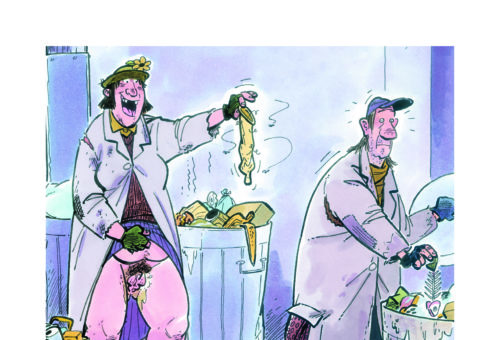A single class of narcotics is responsible for more than 16,000 overdose deaths and 475,000 emergency room visits annually in America. The Centers for Disease Control and Prevention calls it an epidemic. It’s not coke, crack or black tar heroin. These narcos don’t sport lizard boots and gold chains. Yet the profits they rake in would make the Sinaloa and Los Zetas cartels jealous. The drug peddlers have names like Endo, Cephalon, Roche, Insys and Pfizer—legal pharmaceutical companies pushing prescription painkillers. The class of drugs is known as opioids, and if that sounds like opium, the source of heroin, that’s no accident. Both are derived from the same plant. Essentially, pharmaceutical companies are pushing legal versions of supercharged heroin and encouraging doctors to overprescribe. More Americans now die from these legal drugs than from heroin and cocaine combined.
Perhaps the most famous victim is Prince, the rock star who overdosed on Fentanyl, an opioid 50 times stronger than heroin. The company producing Fentanyl, Insys Therapeutics, is being investigated in five states for deceptive marketing practices. Oregon Assistant Attorney General David Hart stated that Insys demonstrated the most “unconscionable” conduct he had ever witnessed. Illinois Attorney General Lisa Madigan insisted the company’s “desire for increased profits led it to disregard patients’ health and push addictive opioids for non-FDA-approved purposes.”
Now Insys Therapeutics is developing a synthetic form of THC (the active chemical in marijuana) called Dronabinol. As more and more studies demonstrate the beneficial properties of marijuana, Big Pharma is funding a Reefer Madness crusade to roll back the cannabis revolution in favor of synthetic derivatives that can’t be grown in your own backyard or purchased from your local dispensary. That’s why Insys donated $500,000 to fight cannabis legalization in Arizona, even though the company concedes the scientific consensus that pot is more beneficial than Dronabinol. Other cannabis derivatives concocted by pharmaceutical companies include Marinol, Sativex, Cesamet and Nabilone—all threatened by the expanding legal pot revolution.
And it is a revolution. Medicinal marijuana has been proven to reduce nausea and vomiting after chemotherapy; improve appetite in HIV patients; and effectively treat chronic pain, seizures and muscle spasms. Recent scientific studies have demonstrated that THC can actually shrink some malignant tumors. It also promises to be a cure for Alzheimer’s disease. If the latter seems ironic, due to the infamous “short-term” amnesia experienced by many potheads, it’s explained by the astounding fact that our brains naturally produce endocannabinoids, very similar to THC, which inhibit the inflammatory proteins that cause nerve cell death. It’s important to note that there has never been a single overdose on pot. Could it be that Mother Nature has provided us with a wonder drug superior to the reductionist extracts Big Pharma is trying to monopolize?
Prodded by successful legalization efforts in the states, the DEA considered relisting marijuana from Schedule I—the most dangerous— to a less onerous category last summer, but balked, ignoring evidence of its positive health effects. Nope, marijuana still has “no currently accepted medical use,” according to the DEA, despite the U.S. Department of Health and Human Services holding Patent No. 6,630,507 for the use of cannabinoids to treat neurological diseases—research funded by a government agency, the National Institutes of Health!
Medicinal marijuana is now illegal in less than half of the U.S., but Big Pharma is still determined to limit marijuana use. Their vanguard troops are CADCA (Community Anti-Drug Coalitions of America) and PDFA (Partnership for Drug-Free Kids), both fighting cannabis legalization initiatives across the 22 states where prohibition still reigns. Both are funded by a rogue’s gallery of opioid pushers: Purdue Pharma, the maker of OxyContin; Abbott Laboratories, maker of Vicodin; and Alkermes, maker of the new painkiller Zohydro (ten times stronger than Vicodin); among others. Of course both “anti-drug” groups are dead silent on the Stop Oxy Abuse Act and Safe Prescribing Act now before Congress, designed to curtail rampant overprescription of the deadly drugs.































